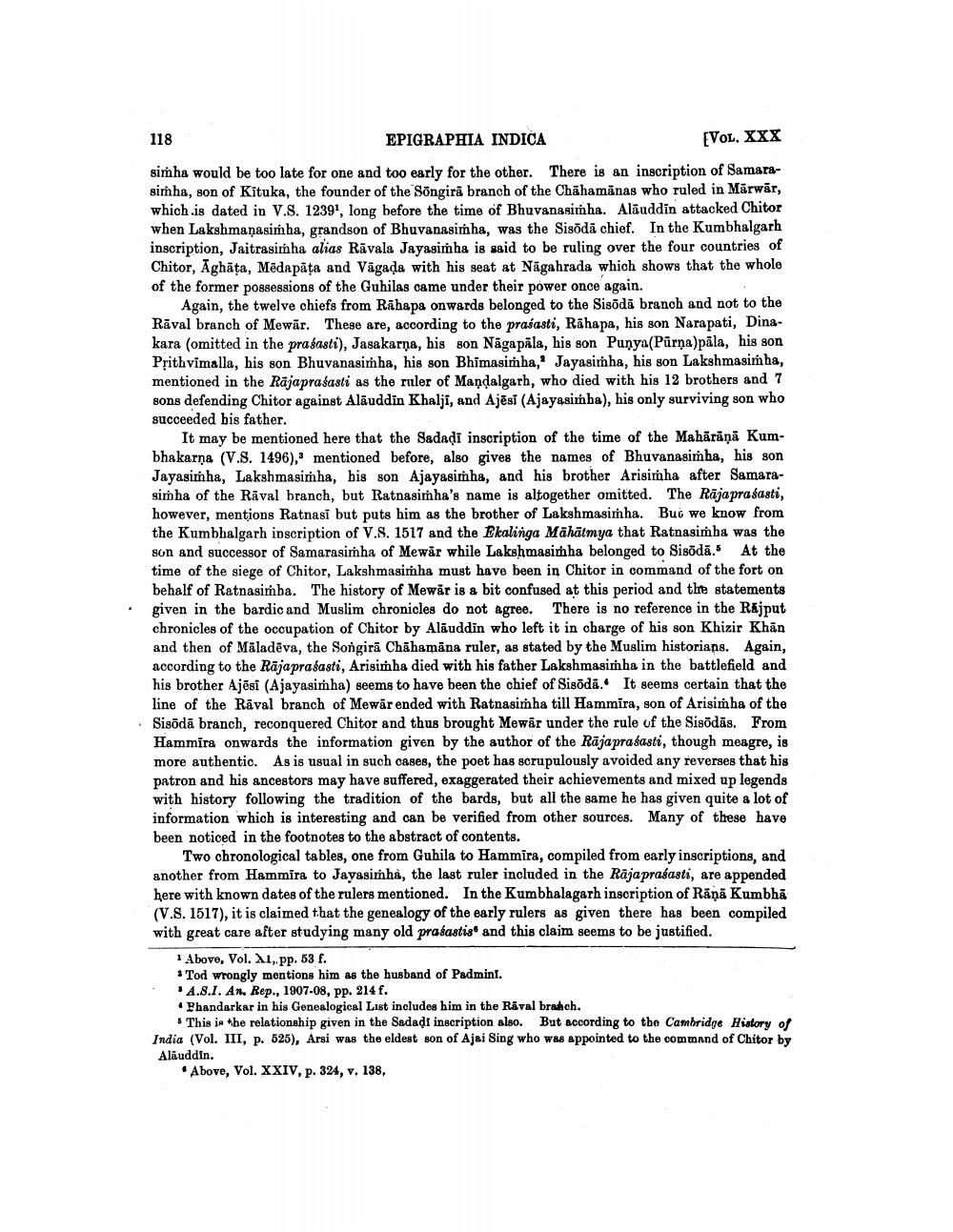________________
118
EPIGRAPHIA INDICA
[VOL. XXX
simha would be too late for one and too early for the other. There is an inscription of Samarasimha, son of Kituka, the founder of the Söngira branch of the Chāhamānas who ruled in Mārwār, which is dated in V.S. 1239, long before the time of Bhuvanasinha. Alauddin attacked Chitor when Lakshmanasimha, grandson of Bhuvanasimha, was the Sisõdã chief. In the Kumbhalgarh inscription, Jaitrasimha alias Rävala Jayasimha is said to be ruling over the four countries of Chitor, Aghāta, Mēda pāța and Vägada with his seat at Näga hrada which shows that the whole of the former possessions of the Guhilas came under their power once again.
Again, the twelve chiefs from Rāhapa onwards belonged to the Sisodā branch and not to the Rāval branch of Mewār. These are, according to the prasasti, Rāhapa, his son Narapati, Dinakara (omitted in the prasasti), Jasa karņa, his son Nägapāla, his son Punya(Pūrņa)pāla, his son Přithvimalla, his son Bhuvanasimha, his son Bhimasimha,' Jayasimha, his son Lakshmasimha, mentioned in the Rajaprasasti as the ruler of Mandalgarh, who died with his 12 brothers and 7 sons defending Chitor against Alauddin Khalji, and Ajēsi (Ajayasimba), his only surviving son who succeeded his father.
It may be mentioned here that the Sadadi inscription of the time of the Mahäränä Kumbhakarna (V.S. 1496)," mentioned before, also gives the names of Bhuvanasimha, his son Jayasimha, Lakshmasimha, his son Ajayasimha, and his brother Arisimha after Samarasimha of the Rāval branch, but Ratnasimha's name is altogether omitted. The Rāja prasasti, however, mentions Ratnasi but puts him as the brother of Lakshmasimha. Buo we know from the Kumbhalgarh inscription of V.S. 1517 and the Ekalinga Māhātmya that Ratnasimba was the son and successor of Samarasimha of Mewar while Lakshmasimha belonged to Sisõdā.5 At the time of the siege of Chitor, Lakshmasimha must have been in Chitor in command of the fort on behalf of Ratnasimba. The history of Mewar is a bit confused at this period and the statements given in the bardic and Muslim chronicles do not agree. There is no reference in the Rajput chronicles of the occupation of Chitor by Alauddin who left it in charge of his son Khizir Khān and then of Māladēva, the Songirã Chāhamāna ruler, as stated by the Muslim historians. Again, according to the Raja prasasti, Arisimha died with his father Lakshmasimha in the battlefield and his brother Ajēsi (Ajayasimha) seems to have been the chief of Sisõda.• It seems certain that the line of the Rāval branch of Mewär ended with Ratnasimha till Hammira, son of Arisimha of the Sisõdā branch, reconquered Chitor and thus brought Mewär under the rule of the Sisödās. From Hammīra onwards the information given by the author of the Rājaprasasti, though meagre, is more authentic. As is usual in such cases, the poet has scrupulously avoided any reverses that his patron and his ancestors may have suffered, exaggerated their achievements and mixed up legends with history following the tradition of the bards, but all the same he has given quite a lot of information which is interesting and can be verified from other sources. Many of these have been noticed in the footnotes to the abstract of contents.
Two chronological tables, one from Guhila to Hammira, compiled from early inscriptions, and another from Hammira to Jayasimhà, the last ruler included in the Rāja prasasti, are appended here with known dates of the rulers mentioned. In the Kumbhalagarh inscription of Rāṇā Kumbhā (V.S. 1517), it is claimed that the genealogy of the early rulers as given there has been compiled with great care after studying many old prasastisk and this claim seems to be justified.
1 Above, Vol. 1, pp. 53 f. * Tod wrongly mentions him as the husband of Padmini.
A.8.1. An. Rep., 1907-08, pp. 214 f. • Phandarkar in his Genealogical List includes him in the Raval brashch.
* This is the relationship given in the Sadadi inscription also. But according to the Cambridge History of India (Vol. III, p. 525), Arsi was the eldest son of Ajai Sing who was appointed to the command of Chitor by Alauddin.
. Above, Vol. XXIV, p. 324, v, 138,




